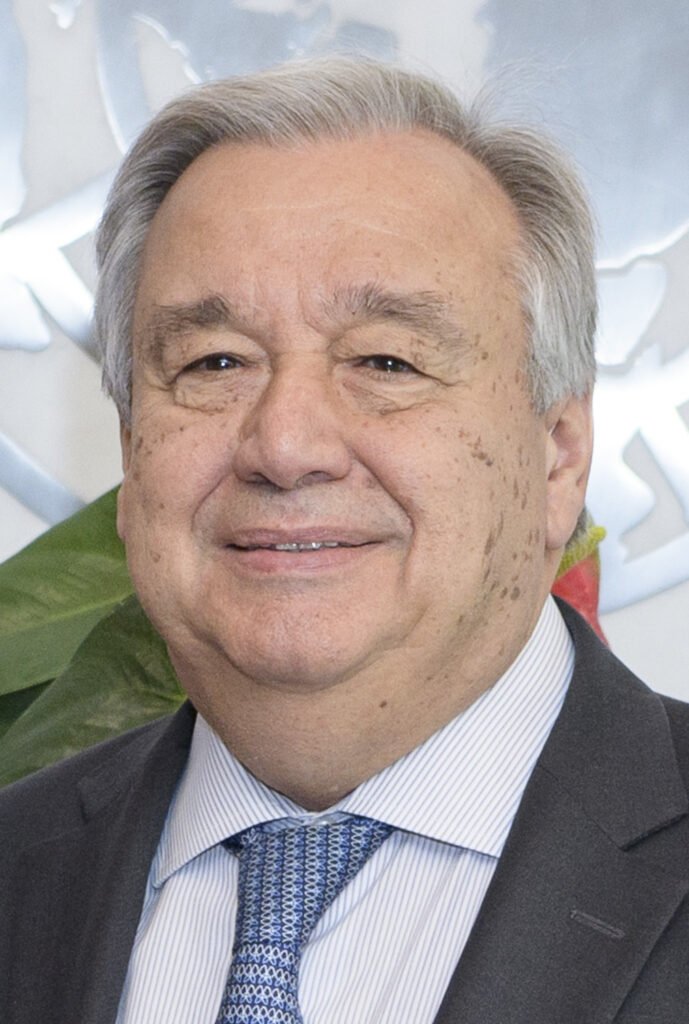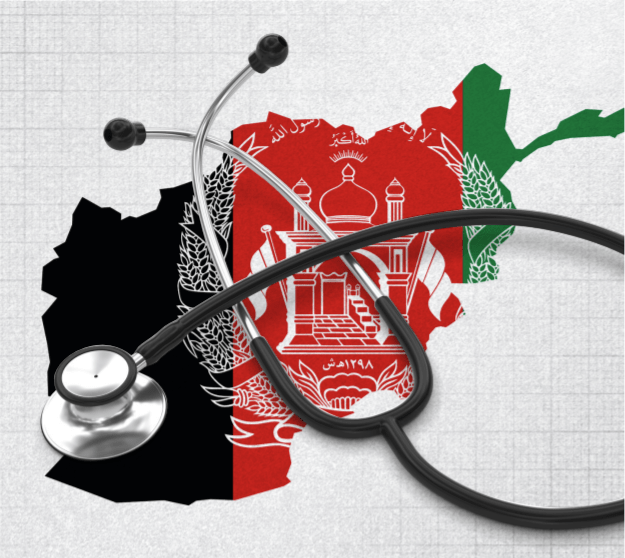The horrors witnessed during the US and allied withdrawal from Afghanistan shocked the world and now the country’s
healthcare system is at risk of collapse. Bette Browne reports
Unless the world responds with humanitarian aid to the Afghanistan crisis, more than 14 million Afghans – one-third of the population – could face starvation, according to experts. There is also a danger that diseases such as tuberculosis (TB) and polio will become even more widespread.
The country, now under the control of the Taliban after 20 years of war, is facing a “looming humanitarian catastrophe”, the United Nations (UN) warned, while the agency’s Office for the Coordination of Humanitarian Affairs said basic servicers are collapsing and other life-saving aid is about to run out.
MSF
Médecins Sans Frontières (MSF) also expressed alarm in comments to the Medical Independent (MI).
“The Afghan healthcare system has for years been under-funded, under-resourced and under-staffed,” said Dr Tankred Stoebe, an MSF Afghanistan medical coordinator.
“The health system is hugely reliant on foreign donors and if the recent suspension of funding from the EU, the World Bank and others persists then the system will inevitably collapse with Afghan men, women, and children facing the consequences.”
Dr Tankred Stoebe

The World Bank paused disbursements to its projects in Afghanistan on 24 August, due to concerns about the potential impact the Taliban government will have on the country and especially on women.
“We are deeply concerned about the situation in Afghanistan and the impact on the country’s development prospects, especially for women. We have paused disbursements in our operations in Afghanistan and we are closely monitoring and assessing the situation in line with our internal policies and procedures,” a World Bank spokesperson told CNN.
The World Bank has provided more than $5.3 billion (€4.5 billion) for development and emergency reconstruction projects and eight budget support operations in Afghanistan since April 2002. It also administers the Afghanistan Reconstruction Trust Fund, the World Bank’s largest single-country multi-donor trust fund.
The EU’s foreign policy chief, Mr Josep Borrell, said in August that “no payments are going to Afghanistan right now. No payments of development assistance until we clarify the situation.” In November 2020, the EU had promised to donate €1.2 billion over the next four years in long term and emergency assistance.
Potential collapse
of the healthcare
system is one of
our major concerns
MSF does not take any funding from governments or agencies for its medical work in Afghanistan, so the organisation is able to continue with all of its activities, Dr Stoebe told MI.
However, he added: “We have already seen the consequences of the breakdown in other health services as more and more patients come to us for treatment with few other places to turn.
“In Boost Hospital in Lashkar Gah (southern Afghanistan) we have at times seen over 750 patients per day in
our emergency room, and our feeding centre for malnourished children in Herat (in the north-west) is at 200 per cent bed occupancy.”
The country desperately needs humanitarian aid to continue, Dr Stoebe emphasised. “It is inconceivable that MSF, other international organisations or NGOs could ever fill the void and
run all the country’s hospitals and clinics on their own. When the health and lives of millions of Afghans are in the balance, development and humanitarian aid must continue.”
His sentiments were echoed by another MSF official, Ms Martine Flokstra, who said the healthcare systems risked potential collapse. She said an already dire situation in Afghanistan’s hospitals has become worse since the Taliban takeover. Medical workers had not received salaries in months and health centres were running out of medicines amid an increase in the number of patients coming to facilities.
“So potential collapse of the healthcare system is one of our major concerns,” she told Al Jazeera. Afghanistan has suffered terribly from four decades of uninterrupted war, first during the 1979 Soviet invasion and then in 2001 when the US ousted the Taliban following the 9/11 attacks. Today, the country remains among the world’s poorest nations, according to the United Nations Human Development Report 2020, with more than half the population living below the poverty line.
It has been reported that the 20-year war cost the US a staggering $300 million a day. But the price paid by Afghans, who now face a humanitarian and human rights nightmare, is incalculable. Food shortages are being exacerbated by drought, the World Food Programme (WFP) emphasises, as the country is in the grip of its second drought in four years.
“We have four million people in the most difficult areas where winter just compounds the opportunity to reach them,” WFP Executive Director Mr David Beasley told Al Jazeera. He added that the programme would start to run
out of food in September without additional funding.
Mr David Beasley

The Covid-19 pandemic is also hitting the country hard. The UN said earlier this year that nearly half of all people being tested are positive for the virus, suggesting it is widespread. But due to low testing rates and the lack of a national death register, “confirmed cases of and deaths from Covid-19 are likely to be under-reported overall in Afghanistan,” according to a UN report in April.
Polio and TB
The battle against polio is also threatened. Polio remains endemic in two countries – Afghanistan and Pakistan – according to the Global Polio Eradication Initiative (GPEI). “Until poliovirus transmission is interrupted in these countries, all countries remain at risk of importation of polio, especially vulnerable countries with weak public health and immunisation services and travel or trade links to endemic countries.”
A ban on house-to-house vaccination was imposed in May 2018 and became more stringent in April 2019. This led to no vaccination campaigns from April to July 2019, the GPEI said. However, it still hopes to continue its work.
“The Global Polio Eradication Initiative is closely monitoring developments in Afghanistan. GPEI partners and staff are currently assessing immediate disruptions to polio eradication efforts and the delivery of other essential health services, to ensure continuity of surveillance and immunisation activities while prioritising the safety and security of staff and frontline health workers in the country.
“The polio programme in Afghanistan has operated for many years amid insecurity and conflict, and will continue working with all factors, agencies and organisations who enable delivery of immunisation as well as deliver humanitarian assistance to populations in need across the country. The GPEI remains steadfastly committed to protecting all children from polio and supporting the provision of other essential immunisations and health services.
“We strongly believe that the delivery of healthcare – including polio vaccination – is essential to prevent diseases and safeguard communities. Together with our partners, the people of Afghanistan, national and provincial authorities, we will do everything in our power to continue this critical work.”
It will also be a tougher battle against other diseases, such as TB and malaria. TB is a major cause of mortality in Afghanistan with an annual risk of infection of 3 per cent. The disease is affecting more women than men, with 70 per cent of reported TB cases affecting females. Pregnant women and children under five in Afghanistan are also at high risk of malaria.
“The international community has spent decades working with the people of Afghanistan to make progress. Now the international community must continue to support the people of Afghanistan if those gains are not to be reversed,” the World Health Organisation (WHO) stated, as the US and its allies left the country.
The WHO statement sought to calm fears that the world was abandoning the Afghan people amid a deepening health and humanitarian crisis. “Now, as always, we remain committed to the people of Afghanistan and will do everything possible to stay and provide assistance, especially to the most vulnerable,” the WHO said. “The people of Afghanistan need our support now more than ever. Our organisations are committed to helping and protecting them. We will stay in Afghanistan and we will deliver.
“We echo the UN Secretary-General’s call for all parties, including the Taliban, to cease all violence and comply with international humanitarian law and human rights. They must allow and facilitate safe, rapid and unimpeded access for humanitarian workers – both male and female staff – so they can deliver aid to civilians in need wherever they are.”
Women’s health
The reference to ensuring access to female staff in Afghanistan is particularly important. In health facilities where only male health personnel are available, utilisation of the services by women is very low because of social and cultural barriers.
“Currently, women and girls struggle to access even the most basic information about health and family planning,” according to the WHO.
“There is an unmet need for modern forms of contraception. Prenatal and postnatal care is often unavailable; specialty care, such as modern cancer and fertility treatment, is largely non-existent; routine preventative care, such as pap smears and mammograms, are almost unheard of; and a large proportion of births are still unattended by a professional.”
Human Rights Watch also emphasises that women and children in Afghanistan have a distinctly higher burden of illness and death. It is estimated that 40 per cent of children are under weight and more than 50 per cent of all deaths occur in those under the age of five. The higher death rate in women is mainly due to maternal causes such as antepartum and postpartum haemorrhage, obstructed labour, puerperal infections, pregnancy induced hypertension, and pregnancy anaemias.
Over the past two decades, Afghanistan has depended on international donor support to fund essential services, like healthcare. But this support has been falling for years and will likely continue to do so – perhaps precipitously – following the US withdrawal, Human Rights Watch warns. “This decline in funding has already had a harmful – and life-threatening – impact on the lives of many Afghan women and girls, as it affects access to, and quality of, healthcare.”
The Taliban has made promises about treating women differently, but it is instructive to look at their record when last in power. When the Taliban ruled Afghanistan 20 years ago, their harsh version of Islamic law affected every aspect of life and had a particularly strong impact on medical care, especially as it related to women.
They banned women from medical schools and prevented male physicians from examining female patients. They forbade women studying nursing from looking at images of the human body and also outlawed the dissection of cadavers.
They imposed restrictions on the movement of women and girls that dramatically curtailed their access to healthcare. One woman described to Human Rights Watch giving birth at home unattended, as she was afraid of being beaten if she left the house. “I was scared of them,” she said. “They don’t care if you die.” The Taliban has also generally opposed the provision of modern contraception.
In the years after the US-led military invasion and the defeat of the Taliban regime in late 2001, the Afghan government and international donors gave priority to developing an effective health system, including extending access to basic health care to all parts of the country.
The effort led to important achievements, including significant declines in maternal mortality, and increases in provision of prenatal care, use of modern contraception, and attended births.
We are committed to carrying on our medical
work in all five of our projects in Afghanistan
The life expectancy at birth of Afghan women is 66 years. One factor contributing to Afghanistan’s high rate of maternal mortality is the prevalence of child marriage. About 35 per cent of girls in Afghanistan marry before the age of 18, and 9 per cent marry before the age of 15.
Even with two decades of effort and investment, Human Rights Watch says the delivery of health services for women remains far below international standards, and progress is being eroded.
It said officials in the health ministry confirmed that the government previously had more ability to provide supplies to health facilities, but as donor funding declined this capacity has shrunk and sometimes disappeared.
Afghanistan has 4.6 doctors, nurses, and midwives per 10,000 people, far below the threshold for critical shortage of 23 healthcare professionals per 10,000 people set out by the WHO.
High poverty rates are another factor crippling healthcare. Poverty is alarmingly high in Afghanistan and rising dramatically. The percentage of people living below the national poverty line rose from 38 per cent in 2011 to 55 per cent in 2016. The World Bank estimated in mid-2020 that the country’s economy could contract by 6-to-7 per cent in 2020 due to the Covid-19 pandemic and poverty was likely to rise to between 61 and 72 per cent – all of which was estimated before the Taliban takeover in August.
Aid
A number of donors have said they will continue to help the devastated country. At a UN conference in Geneva on 13 September, the UN Secretary General Mr António Guterres announced a $20 million (€17 million) allocation from the UN Central Emergency Response Fund to support humanitarian operations in Afghanistan. “The people of Afghanistan need a lifeline,” he declared. “Now is the time for the international community to stand with them. The people of Afghanistan are facing the collapse of an entire country – all at once. Today, one-in-three Afghans does not know where their next meal will come from. The poverty rate is spiralling – and basic public services are close to collapse.

Mr António Guterres
Hundreds of thousands of people have been forced to flee their homes.
“At the same time, Afghanistan faces a severe drought – the second to hit the country in four years. Many people could run out of food by the end of this month, just as winter approaches.”
He also urged international support for a ‘Flash Appeal’ for $606 million, which was launched by the UN Office for the Coordination of Humanitarian Affairs to get urgent assistance to 11 million people between September and December. But promises of aid by the international community have fallen short in the past. At a November 2020 conference in Geneva, donors pledged about $2 billion less for the period 2021-2024 than they had for 2016-2020.
This came at a time when the United Nations Development Programme (UNDP) had calculated that due to the impact of the Covid-19 pandemic, Afghanistan would need an increase of 30 per cent in international aid to maintain the level of government expenditure initially planned in the International Monetary Fund projections.
Overall development assistance to the country, according to the OECD Development Assistance Committee, was $6,862 million in 2013 and $4,053 million in 2019. The US provided a total of $16,748 million in assistance in 2010, versus $3,120 million in 2021. While some donors, such as the EU, have pledged to maintain their prior funding level, others are cutting their funds significantly. No major donors are significantly increasing their aid to Afghanistan.
“We are committed to carrying on our medical work in all five of our projects in Afghanistan”
The Red Cross and Red Crescent have been in Afghanistan since 1987 and have committed to staying to help those in need. The head of the International Committee of the Red Cross (ICRC) orthopaedic programme in Afghanistan, Mr Alberto Cairo, is continuing to oversee the ICRC’s seven orthopaedic centres during a time of change and transition in the country.
The programme’s largest centre, in Kabul, remains open, but operating at reduced capacity. “If we leave, who stays? We are supposed to work in places at war,” Mr Cairo told the BBC. “The Red Cross is committed to supporting the people of Afghanistan. The Red Cross will not reduce our presence. We have worked there for 30 years. We will not stop now.”
MSF is similarly committed to its work in the country, Dr Stoebe told MI. “We are committed to carrying on our medical work in all five of our projects in Afghanistan, which never stopped even during the heaviest of the fighting, so long as the security situation allows us to.”
Attacks on healthcare
Humanitarian and healthcare workers, however, can face devastating violence. In 2020, the United Nations Assistance Mission in Afghanistan verified 90 attacks impacting healthcare delivery, 71 of which they attributed to the Taliban. A particularly horrific example was the May 2020 attack on a hospital maternity ward, operated by MSF, in which attackers systematically killed 24 people, including mothers, women in labour, new-borns, a midwife, and two children under 10.
Research is also taking a major hit in the country. Back in 2001, after the overthrow of the Taliban, international funding poured into Afghanistan and some universities thrived. Since 2004 the World Bank, the US Agency for International Development, and other international organisations have poured hundreds of millions of dollars into universities to support teaching, faculty training, and research. But now many academics fear for their safety.
“Researchers at risk must be able to leave and to resume their lives in countries that can provide them with safety and security,” stated a Nature editorial in August. At the same time, research leaders in Afghanistan’s neighbouring countries are staying, and they “must not be forgotten or neglected”.













Leave a Reply
You must be logged in to post a comment.